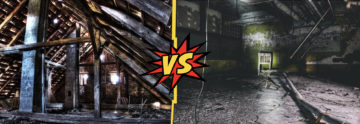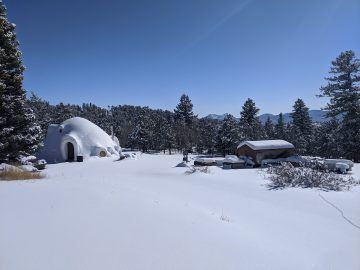by Deanna K. Kreisel (Doctor Waffle Blog)
 There are two kinds of people in this world: those who find basements scary and those who find attics scary. I suppose there might be some folks (bless their hearts) who are disturbed by both, like those ethereal creatures with one blue eye and one brown. I refuse to countenance the idea of people who have no feelings of unease in either space. To be that well-adjusted, that free from inchoate fear, that grounded in the solid objects of reality—I draw back in horror at the thought. We will leave these hale and pragmatic types to their smoothies and their 401Ks and godspeed to them.
There are two kinds of people in this world: those who find basements scary and those who find attics scary. I suppose there might be some folks (bless their hearts) who are disturbed by both, like those ethereal creatures with one blue eye and one brown. I refuse to countenance the idea of people who have no feelings of unease in either space. To be that well-adjusted, that free from inchoate fear, that grounded in the solid objects of reality—I draw back in horror at the thought. We will leave these hale and pragmatic types to their smoothies and their 401Ks and godspeed to them.
Of course, having sketched this rigid opposition, I must immediately set about tearing it apart. (I was trained in literary criticism in the 1990s, and am constitutionally incapable of leaving a perfectly good dichotomy in peace.) I personally am creeped out by both attics and basements, but in different contexts: attics in dreams and basements in reality. (Dreams include literature and reality includes movies.) The idea of attics is deliciously spooky: that’s where the ghosts live, and the animals that sound like ghosts when you’re alone in the house at night. But I would be hard pressed to feel truly frightened in a real attic: they’re mostly hot, and cramped, and full of prickly insulation and mouse poop, and you’re there to grab the box of back-up highball glasses or the fake Christmas tree and get out before you boil to death. Even filmed attics fail to be genuinely scary: they are usually picturesquely stuffed with picturesquely overflowing trunks full of the heroine’s ancestor’s stuff from Ye Olden Times. (The ancestor always seems to have been a theatrical impresario or budding lexicographer.) If there is a moment of fright, it’s occasioned by the heroine catching a glimpse of herself in a full-length beveled mirror in the corner and then laughing when she realizes it’s just her reflection. Later she will try on some of the theatrical costumes from the trunks and study herself in the same mirror, where she will notice a resemblance to her ancestor for the first time. Read more »

